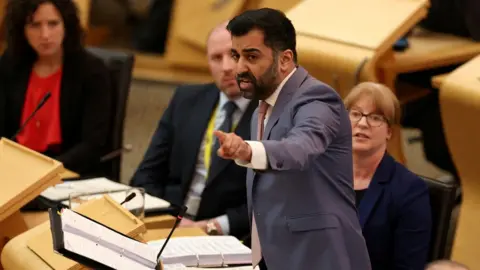Chris Mason: SNP leader Humza Yousaf struggling in political headwind
 Reuters
ReutersSo often, we see politicians in one dimension.
That is as much a failing of journalism as it is of those who hold elected office.
The ritual of the back and forth of scrutiny, vital as it is, can feel quite shallow.
Questions on the big topic of the day from us reporters, and replies, often carefully rehearsed, some of which amount to actual answers.
But sometimes circumstance presents a moment where a leader is seen in three dimensions; the human behind any political façade exposed.
So it was on the ninth floor of a Glasgow hotel, with views over the Clyde, as Humza Yousaf, Scotland's First Minister, did a round of interviews ahead of his first Scottish National Party conference as leader.
As we sat down, he showed me a text message from his mother-in-law, Elizabeth El-Nakla, who is currently trapped in Gaza with her husband, seeing family.
Mrs El-Nakla could hear air strikes nearby. Earlier she had sent an emotional video message to Mr Yousaf and his wife, Nadia, which the First Minister had shared on social media.
Having barely slept in days, Mr Yousaf kept nipping out to take more calls from family.
He told me that while Israel had a right to defend itself, its actions in Gaza "are going too far."
His register, his tone, his demeanour were that of a husband, father and son-in-law worried, exhausted and powerless.
But we met principally to talk about his day job - being Scotland's First Minister, at just the point, after years of dominance of Scottish politics, things are getting rather turbulent for the SNP.
Just like the rest of us, the signs of ageing for governments are inescapable.
The SNP have been in devolved government in Scotland since 2007 - a huge stint in office.
It means they carry the baggage of their record. They insist they have much to be proud of.
But critics point to a struggling NHS, a wide educational attainment gap between the richest and poorest, and, despite recent improvements, the worst rate of death from drugs anywhere in Europe.
Recent blows
The SNP have dominated the Scottish contingent of MPs at Westminster in every general election since the independence referendum in 2014.
But now things appear to be changing.
Earlier this year, Humza Yousaf's predecessor Nicola Sturgeon was arrested, as was her husband, the SNP's former Chief Executive Peter Murrell and its former Treasurer Colin Beattie.
All were released without charge as part of an ongoing investigation into the party's finances.
Last week, the SNP lost a by-election to Labour.
This week, they lost an MP to the Conservatives, the latest illustration of the turmoil among the party's Westminster group.
Independence struggle
And Labour now hope they can take a couple of dozen seats at least from the SNP at the general election.
The government at Westminster has refused to grant another independence referendum, despite there being majority support for one in the Scottish Parliament, something independence supporters regard as an outrage.
It means, for now at least, the SNP have run out of road in securing another referendum and its political fortunes are appearing to shrivel.
For years the party were dominant when, arguably, there were favourable conditions for those seeking to make the case for independence.
There were several Conservative governments, which Scotland didn't vote for.
And there was Brexit, which Scotland didn't vote for either.
But, while opinion polls ebb and flow, there has never been evidence of consistent and sustained majority support for independence across Scotland.
Mr Yousaf acknowledges this and acknowledges that making the positive case for independence - rather than focusing on the perceived negatives of Westminster government - will be key to changing that.
The big challenge he faces is trying to do this while the SNP walk into the most gusty of political headwinds it has faced in years.
Scotland remains split down the middle on the question of its constitutional future.
But with the Conservatives and Labour opposed to another independence referendum, and the SNP looking like they might be going backwards politically, supporters of the Union have not been so optimistic in years.
